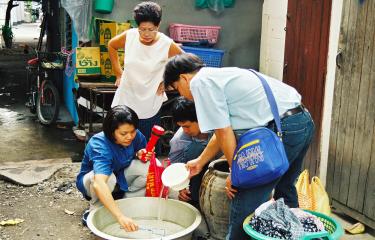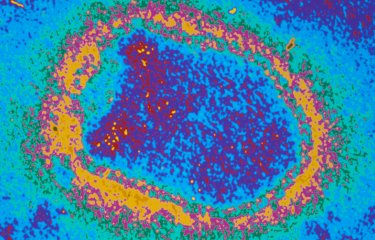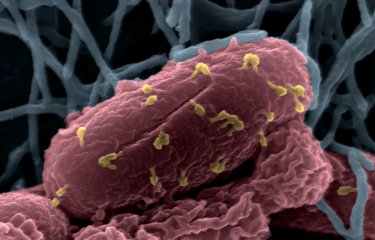France would be more suspicious of vaccines than more than 140 other countries, according to a global survey into how people around the world think and feel about science and major health challenges, published on June 19th, 2019. However, vaccines have made a key, cost-effective contribution to the prolongation of life expectancy and quality. Nowadays, vaccinology and immunology are facing challenges at the level of society, scientific innovation, and technology. In an article published at the end of 2018 in the Journal of Experimental Medicine, researchers from the Institut Pasteur-Fondazione Cenci Bolognetti (member of the Institut Pasteur International Network) argue why vaccines represent a safety belt and a life insurance for humankind.
The Wellcome Global Monitor, just released on June 19th, 2019, shows that France is more suspicious of vaccines than more than 140 other countries. It is the world's largest study of citizens' opinions about science and major health issues. It interviews more than 140,000 people from more than 140 countries. Questioned recently in Science, Olivier Schwartz, scientific director of the Institut Pasteur in Paris, is not surprised by the results of the survey and points out that opinions are not always correlated to behavior, because "it's the French paradox (...), vaccination coverage remains high". The newspaper specifies that "among the French parents interviewed, 91% say that their children are vaccinated, which corresponds to the global average of 92%". (From the journal Science). "It's important to be vaccinated to protect yourself personally, of course, but above all it's about protecting others" reminded us in July 2017 Prof. Philippe Sansonetti, head of Molecular Microbial Pathogenesis Unit as health professionals swang into action in France to support the state project making 11 vaccines mandatory for toddlers. "Especially to protect those who are vulnerable: children, the elderly (who represent an increasing proportion of the French population), pregnant women, and immunodeficient people receiving cancer treatment, for example, who cannot be vaccinated for medical reasons. That's why I wouldn't say I'm especially "pro-vaccine" but I'm definitely "pro-children's health"! And collective protection also boosts our chances of eliminating some infectious diseases." In 2017, Philippe Sansonetti published a book (Vaccines, Ed. Odile Jacob), a powerfully argued alarm call recalling the effectiveness of vaccines.
Since the beginning of the 20th century, humanity can live better, and longer. In developed countries, life expectancy has risen from 40 to 80 years, and the same observation, to a lesser extent, is made in the developing countries. “Vaccines have played a major role in this dramatic improvement, which is unprecedented in the history of humankind” says Angela Santoni, scientific director of the Institut Pasteur-Fondazione Cenci Bolognetti (member of the Institut Pasteur International Network).
Not only vaccines are a formidable protection in health but the figures are also unanimous. $ 1 invested in vaccines development saves $ 10 to $ 44 for the healthcare system. It has been estimated that 25 million deaths could be avoided between 2010 and 2020 thank to vaccines, which represents five lives saved per minute. Nevertheless, vaccines, no matter how effective, are face with growing opposition particularly in developing countries.
The vaccine paradox
Several reasons explain the recent rise in vaccines skepticism. First, because vaccines, victims of their own success, raise hopes that infectious diseases are no longer part of the threats of the developed world. In addition, fakes news, such as the link between vaccines and autism, is mass-disseminated by the Internet (especially on social media) and finds credibility, both with a naïve audience and at a governmental level. Other beliefs circulate. For example, the fact that "natural" is good in every way leads some to believe that diseases such as measles constitute a kind of immune training. Conversely, the fact that pathogens are very strong for suppressing immunity is not appreciated. “It is our social responsibility as a scientific community to stand and promote understanding of the value of vaccination. It is refreshing in this perspective that national and international immunological societies have engaged their members in educational activities with the lay public and have taken firm stands on policy issues” insists Angela Santoni.
A global health cornerstone
Building a healthier world has been possible thanks to vaccines. There are several examples. Even today, more than one million children die each year due to lack of access to the eleven WHO-recommended vaccines (tuberculosis, tetanus, pertussis, diphtheria, polio, measles, rubella, pneumococcus, rotavirus, haemophilus influenzae type B and hepatitis B). To deal with this situation, in 2010, a private-public initiative known as Global Alliance for Vaccines and Immunizations (or GAVI) has been launched. The main mission of GAVI was, and remains, to promote access to vaccines for people from the poorest countries and to reduce the time needed to introduce a new vaccine between the developed world and developing countries.
In addition, the HPV vaccine is also part of the GAVI armament. HPV is known to kill around 200,000 women every year, especially in the less privileged countries. Sharing HPV vaccines therefore goes a long way towards improving the health of women around the world.
Also, the immunological approach in cancer therapies would allow developing countries to better cope with the critical increase in cancer, a “forgotten epidemic".
Other challenges still lie ahead. Mycobacterium tuberculosis alone makes 1 million people a year. "Unless a better vaccine is developed, it is unlikely that a substantial reduction of the tuberculosis disease burden will be obtained" explains Angela Santoni. Recent studies suggest that the combination of a protein and an adjuvant could have a protective effect and represent a major turning point in the fight against tuberculosis.
Back to the future
Over the past 40 years, numerous Nobel prize-winning discoveries in the fields of molecular biology, genetics, innate immunity, structural biology and immunotherapy have made it possible to manufacture many vaccines, technically impossible to produce a few decades ago.
Today, vaccines belong to a sophisticated and multidisciplinary science. There is hope for the development of vaccines that can prolong a life of quality in a society facing the aging of the population. The rapid pace of innovation in vaccinology may soon contribute to the prevention and treatment of cancers but also neurodegenerative diseases as Alzheimer's.
Angela Santoni concludes: “Addressing the challenges and tacking the opportunities at the level of civil society and research, in a global health perspective, is imperative to fulfill the reality and potential of vaccines to serve as a safety belt and insurance policy for humankind at present and in the future”.
Source
Vaccines: an achievement of civilization, a human right, our health insurance for the future, Journal of Experimental Medicine, 3 décembre 2018
Rino Rappuoli1,2, Angela Santoni3, Alberto Mantovani4,5,6
1 GlaxoSmithKline, Sienne, Italie
2 Imperial College, Faculty of Medicine, Londres, Royaume-Uni
3 Università « La Sapienza », Dipartimento di Medicina Clinica e Molecolare, Rome, Italie
4 Humanitas Research Hospital, Milan, Italie
5 Humanitas University, Milan, Italie
6 The William Harvey Research Institute, Queen Mary University of London, Londres, Royaume-Uni








